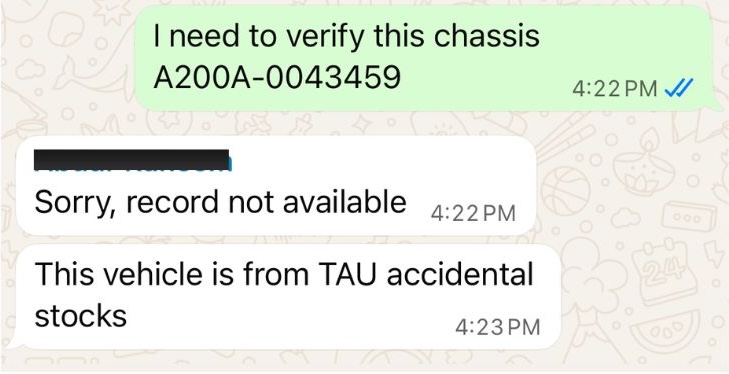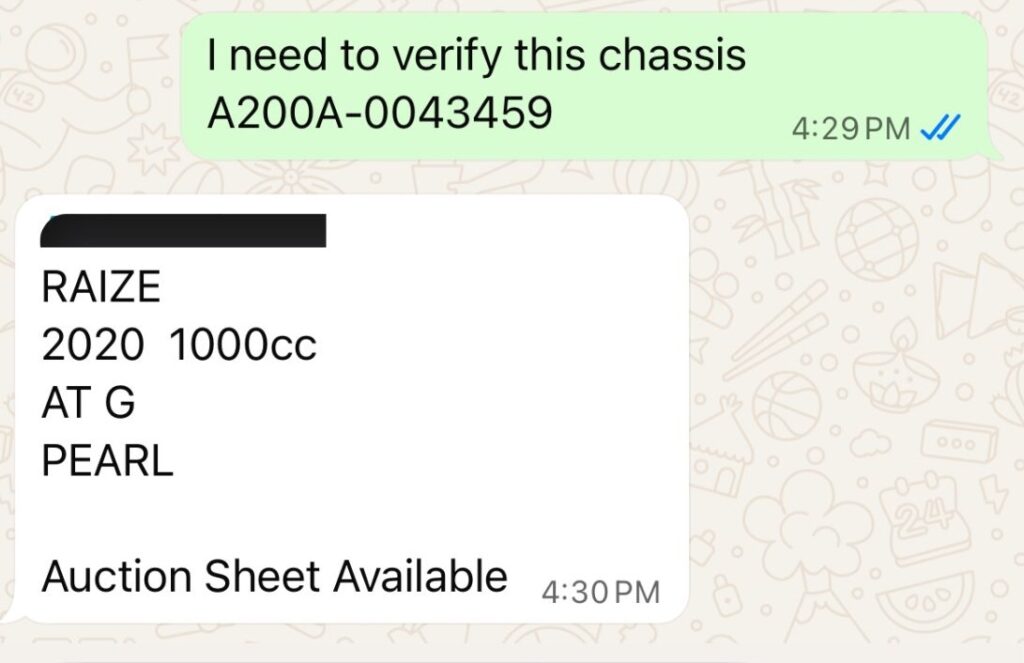1. Growing Problem of Auction Sheet Verification Scams
In the world of used Japanese car imports, the auction sheet is considered the gold standard for verifying a vehicle’s history and condition. These documents provide detailed information about a car’s past, including accident history, repairs, mileage verification, and overall grade. However, a disturbing new trend has emerged where unregistered companies and small fraudulent websites are exploiting this trust to deceive customers. These operations lack actual access to Japanese auction house data yet present themselves as legitimate verification services, deliberately misleading buyers with false information that can cost thousands of dollars.
This case study examines how these scams operate, their impact on consumers, and how you can protect yourself by using only verified, trusted services like JP Sheet and AutoOnes that have genuine access to auction data.
2. How Auction Sheet Verification Should Work
2.1 The Legitimate Process
Authentic auction sheet verification services maintain direct connections with major Japanese auction houses like USS, TAA, JU, and ARAI networks. When you provide a chassis number to a legitimate service, they:
- Query their extensive database of auction records
- Retrieve the original inspection report and high-resolution images
- Provide accurate translations of Japanese remarks
- Deliver a comprehensive report including auction grade, mileage, exterior/interior condition, and any accident history
2.2 What Trusted Services Provide
Reputable companies like AutoOnes and JP Sheet offer:
- Direct access to over 500 auction houses in Japan
- 99% accuracy rates in vehicle history reporting
- Money-back guarantees on their services
- Professional translations of auction sheets
- Additional verification features like water damage checks, meter tampering detection, and repair history
3. The Scam: How Fake Verification Websites Operate
3.1 The Bait: Creating Appearances of Legitimacy
These fraudulent operations typically:
- Create professional-looking websites that mimic legitimate services
- Offer discounted prices (often 50% less than reputable services) to attract budget-conscious buyers
- Claim to have “special access” to auction houses they actually cannot access
- Use technical jargon and fake certifications to appear authentic
3.2 The Switch: Deliberate Misinformation
When customers use these services, the scams unfold through:
- False “not found” reports for vehicles whose records are actually available
- Incorrect grading that either undervalues or overvalues vehicles
- Misleading translations of Japanese remarks
- Fake accident claims on clean vehicles to discourage purchases
- Claiming records are unavailable for vehicles that have clear auction histories
3.3 The Consequences: How Buyers Are Harmed
- Missed opportunities on good vehicles due to false information
- Financial losses from unnecessary repairs based on fake reports
- Purchase of problematic vehicles that were falsely certified as clean
- Erosion of trust in the entire import car market
4. Real-World Case: Jack’s Story

Jack, a first-time car importer from the United Kingdom (UK), recently shared his experience:
“I found a 2020 Toyota Raize with what appeared to be a clean history. Before finalizing, I used a verification service that advertised on social media at half the price of established providers. They claimed the vehicle had been in a major accident and was from the TAU auction, known for problematic vehicles.”
“Fortunately, I decided to double-check with AutoOnes. Their report showed the vehicle was actually from a reputable auction with a Grade 4.5 rating and no accident history. The first company had completely misrepresented the facts—either because they lacked proper access or wanted to sell me a different vehicle through a partner dealer.”

This case exemplifies how these scams operate: providing false information either to benefit affiliated dealers or simply because they lack actual access to authentic auction data.
5. Why These Scams Succeed: Psychological Factors
5.1 Exploiting Information Imbalances
- Language barriers between Japanese and English speakers
- Complexity of auction grading systems
- Geographical distance from auction locations
- Limited technical knowledge among first-time buyers
5.2 Leveraging Trust Signals
Scammers use sophisticated techniques to appear legitimate:
- Fake testimonials and reviews
- Stolen logos from legitimate companies
- Official-sounding names similar to trusted services
- False certifications and memberships
6. How to Identify Fake Verification Services
🚩 Red Flags to Watch For:
- Prices significantly lower than market rate
- No physical address or verifiable contact information
- Pressure to pay quickly without time for due diligence
- Refusal to provide sample reports or detailed explanations
- Lack of transparency about their data sources
- Poor quality translations with grammatical errors
- Blurry or low-resolution auction sheets
✅ Signs of Legitimate Services:
- Clear access to multiple auction houses (USS, TAA, JU, etc.)
- Detailed reports with original images and documents
- Professional translations without spelling or grammatical errors
- Transparent pricing with money-back guarantees
- Verified customer reviews on independent platforms
- Quick response times and customer support
7 The Impact on the Market and Consumers
7.1 Financial Losses
- Buyers overpay for misgraded vehicles
- Unnecessary repairs based on false information
- Lost investments in fraudulent services
7.2 Market Distortion
- Erosion of trust in legitimate verification services
- Decreased confidence in Japanese used car imports
- Unfair competition for honest businesses
7.3 Emotional Toll
- Stress and anxiety for first-time buyers
- Disappointment when expected vehicles are falsely rejected
- Cynicism toward all market participants
8. How to Protect Yourself: Verification Best Practices
8.1 Due Diligence Steps
- Use multiple verification services to cross-check information
- Request sample reports before purchasing full verification
- Verify company credentials through industry associations
- Check independent review platforms like TrustPilot, Google Reviews
- Consult with experienced importers for service recommendations
8.2 Trusted Verification Providers
Based on our research, the following services have established credibility:
- AutoOnes – Access to 500+ auction houses, 99% accuracy rate
- JP Sheet – Professional translations, detailed reports
Table: Comparison of Trusted Verification Services
| Service | Auction Access | Price Range |
|---|---|---|
| AutoOnes | 500+ auction houses | $4-35$ (Depends on Chassis) |
| JP Sheet | Multiple auctions | $4 – 8$, and 35$ for Manual Search |
9. What to Do If You’ve Been Scammed
9.1 Immediate Actions
- Document everything – Save all communications and reports
- Request a refund – Cite false information and misleading claims
- Report to authorities – File complaints with consumer protection agencies
- Share your experience – Warn others on forums and review sites
9.2 Alternative Verification
- Get a second opinion from a trusted service
- Request physical inspection if possible
- Consult with experts through online communities
10. Conclusion: Trust But Verify Your Verifier
The auction sheet verification process is meant to provide transparency and confidence in vehicle purchases, but scammers have found ways to exploit this system. As this case study has shown, fake verification services cause real financial harm and undermine trust in the entire market.
Protecting yourself requires due diligence and using only established, reputable services with proven access to auction house data. Companies like AutoOnes (with access to 500+ auction houses) and JP Sheet (with professional translation services) have built reputations for reliability and accuracy.
Remember: when buying a used Japanese import, verify your verifier before trusting their report. Your financial security and peace of mind are worth the extra effort to ensure you’re working with a legitimate service.
“The bitterness of poor quality remains long after the sweetness of low price is forgotten.” – Benjamin Franklin